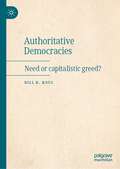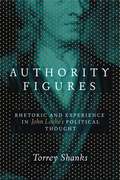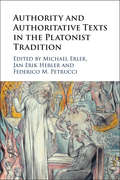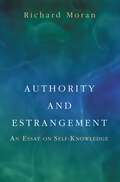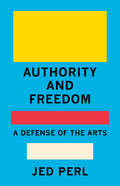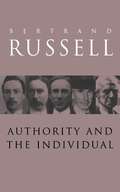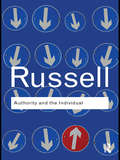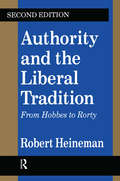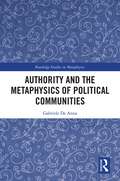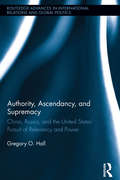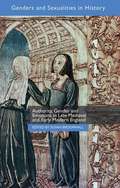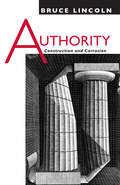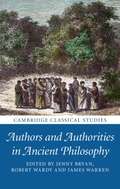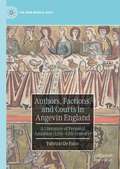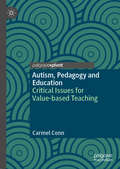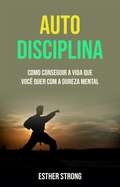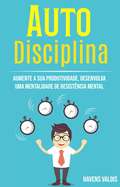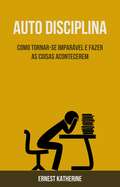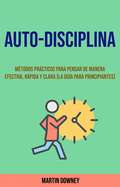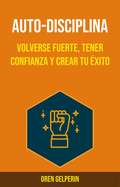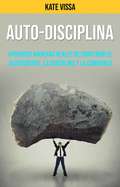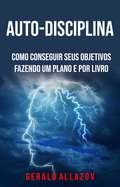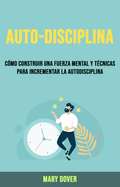- Table View
- List View
Authoritative Democracies: Need or capitalistic greed?
by Bill K. KoulThis book comments on growing authoritarianism in democracy and suggests how it ought to be instead. It asks if some degree of authoritarianism is the need of the hour to address potentially existential issues facing the human race. Readers are encouraged to analyse the state of democracy in their own countries and verify if it meets their expectations, or if it is just a myth or an imposter, or a necessary but imperfect compulsion in the absence of a perfect alternative. The book presents a commentary on the state of democracy in some of the world’s leading democracies. It aims to challenge the human mind, which seems to be getting accustomed to not having to think, thanks to a constant bombardment of information—real and fake and in-between—that it receives through social and print media, which is freely accessible through smartphone to which it has become addicted. It discusses how the drivers of capitalism – through their business-like connections with powerful and influential politicians and celebrities—could be cleverly manipulating the gullible human mind and exploiting the system to their own material benefit.
Authority
by Frank FurediWhere schools in the past used to introduce young people to the norms and values of society, today it seems that schools are there primarily to deal with students' difficult behavior. The school has become a course in Life Skills. Students have to be taught to control their behavior. This shift in priorities has been fed largely by experts in education and other fields, and in so doing they have often pitted schools against parents. This is one of the dangers of the trend, but this kind of therapeutic education also leaves insufficient time and resources for teachers to intellectually stimulate their students.
Authority Figures: Rhetoric and Experience in John Locke's Political Thought
by Torrey ShanksIn Authority Figures, Torrey Shanks uncovers the essential but largely unappreciated place of rhetoric in John Locke’s political and philosophical thought. Locke’s well-known hostility to rhetoric has obscured an important debt to figural and inventive language. Here, Shanks traces the close ties between rhetoric and experience as they form the basis for a theory and practice of judgment at the center of Locke’s work. Rhetoric and experience come together, for Locke, to reorient readers’ relation to the past in order to open up alternative political futures. Recognizing this debt sets the stage for a new understanding of the Two Treatises of Government, in which the material and creative force of language is necessary for political critique.Authority Figures draws together political theory and philosophy, the history of science and of rhetoric, and philosophy of language and literary theory to offer an interpretation of Locke’s political thought that shows the ongoing importance of rhetoric for new modes of critique in the seventeenth century. Locke’s thought offers up insights for rethinking the relationship of rhetoric and experience to political critique, as well as the intersections of language and materialism.
Authority Figures: Rhetoric and Experience in John Locke's Political Thought
by Torrey ShanksIn Authority Figures, Torrey Shanks uncovers the essential but largely unappreciated place of rhetoric in John Locke’s political and philosophical thought. Locke’s well-known hostility to rhetoric has obscured an important debt to figural and inventive language. Here, Shanks traces the close ties between rhetoric and experience as they form the basis for a theory and practice of judgment at the center of Locke’s work. Rhetoric and experience come together, for Locke, to reorient readers’ relation to the past in order to open up alternative political futures. Recognizing this debt sets the stage for a new understanding of the Two Treatises of Government, in which the material and creative force of language is necessary for political critique.Authority Figures draws together political theory and philosophy, the history of science and of rhetoric, and philosophy of language and literary theory to offer an interpretation of Locke’s political thought that shows the ongoing importance of rhetoric for new modes of critique in the seventeenth century. Locke’s thought offers up insights for rethinking the relationship of rhetoric and experience to political critique, as well as the intersections of language and materialism.
Authority and Authoritative Texts in the Platonist Tradition
by Federico M. Petrucci Michael Erler Jan Erik Heßler Michael McoskerAll disciplines can count on a noble founder, and the representation of this founder as an authority is key in order to construe a discipline's identity. This book sheds light on how Plato and other authorities were represented in one of the most long-lasting traditions of all time. It leads the reader through exegesis and polemics, recovery of the past and construction of a philosophical identity. From Xenocrates to Proclus, from the sceptical shift to the re-establishment of dogmatism, from the Mosaic of the Philosophers to the Neoplatonist Commentaries, the construction of authority emerges as a way of access to the core of the Platonist tradition.
Authority and Estrangement: An Essay on Self-Knowledge
by Richard MoranSince Socrates, and through Descartes to the present day, the problems of self-knowledge have been central to philosophy's understanding of itself. Today the idea of ''first-person authority''--the claim of a distinctive relation each person has toward his or her own mental life--has been challenged from a number of directions, to the point where many doubt the person bears any distinctive relation to his or her own mental life, let alone a privileged one. In Authority and Estrangement, Richard Moran argues for a reconception of the first-person and its claims. Indeed, he writes, a more thorough repudiation of the idea of privileged inner observation leads to a deeper appreciation of the systematic differences between self-knowledge and the knowledge of others, differences that are both irreducible and constitutive of the very concept and life of the person. Masterfully blending philosophy of mind and moral psychology, Moran develops a view of self-knowledge that concentrates on the self as agent rather than spectator. He argues that while each person does speak for his own thought and feeling with a distinctive authority, that very authority is tied just as much to the disprivileging of the first-person, to its specific possibilities of alienation. Drawing on certain themes from Wittgenstein, Sartre, and others, the book explores the extent to which what we say about ourselves is a matter of discovery or of creation, the difficulties and limitations in being ''objective'' toward ourselves, and the conflicting demands of realism about oneself and responsibility for oneself. What emerges is a strikingly original and psychologically nuanced exploration of the contrasting ideals of relations to oneself and relations to others.
Authority and Freedom: A Defense of the Arts
by Jed PerlFrom one of our most widely admired art critics comes a bold and timely manifesto reaffirming the independence of all the arts—musical, literary, and visual—and their unique and unparalleled power to excite, disturb, and inspire us.As people look to the arts to promote a particular ideology, whether radical, liberal, or conservative, Jed Perl argues that the arts have their own laws and logic, which transcend the controversies of any one moment. &“Art&’s relevance,&” he writes, &“has everything to do with what many regard as its irrelevance.&” Authority and Freedom will find readers from college classrooms to foundation board meetings—wherever the arts are confronting social, political, and economic ferment and heated debates about political correctness and cancel culture. Perl embraces the work of creative spirits as varied as Mozart, Michelangelo, Jane Austen, Henry James, Picasso, and Aretha Franklin. He contends that the essence of the arts is their ability to free us from fixed definitions and categories. Art is inherently uncategorizable—that&’s the key to its importance. Taking his stand with artists and thinkers ranging from W. H. Auden to Hannah Arendt, Perl defends works of art as adventuresome dialogues, simultaneously dispassionate and impassioned. He describes the fundamental sense of vocation—the engagement with the tools and traditions of a medium—that gives artists their purpose and focus. Whether we&’re experiencing a poem, a painting, or an opera, it&’s the interplay between authority and freedom—what Perl calls &“the lifeblood of the arts&”—that fuels the imaginative experience. This book will be essential reading for everybody who cares about the future of the arts in a democratic society.
Authority and the Individual
by Bertrand RussellFrom Ancient Greek philosophy to the French Revolution to the modern welfare state, in Authority and the Individual Bertrand Russell tackles the perennial questions about the balance between authority and human freedom. With characteristic clarity and deep understanding, he explores the formation and purpose of society, education, moral evolution and social, economical and intellectual progress. First of the famous BBC Reith lectures, this wonderful collection delivers Russell at his intellectual best.First published in 1985. Routledge is an imprint of Taylor & Francis, an informa company.
Authority and the Individual (Routledge Classics)
by Bertrand RussellFrom Ancient Greek philosophy to the French Revolution to the modern welfare state, in Authority and the Individual Bertrand Russell tackles the perennial questions about the balance between authority and human freedom. With characteristic clarity and deep understanding, he explores the formation and purpose of society, education, moral evolution and social, economical and intellectual progress. First of the famous BBC Reith lectures, this wonderful collection delivers Russell at his intellectual best.
Authority and the Liberal Tradition: From Hobbes to Rorty
by Robert HeinemanAuthority and the Liberal Tradition critically describes the historical foundations of modem liberalism, implicitly analyzing the status and effectiveness of American democracy. Heineman examines contemporary liberal ideology, which he argues undermines the normative basis of social stability that was an Important element in the classical liberal tradition. Heineman shows how American government has become hostage to ideology, to the advocacy of interest-group politics. Placing major Anglo-American thinkers from Hobbes to Rorty in their social contexts, Heineman traces the liberal intellectual perspective as it has evolved from the integration of culture and philosophy. He illustrates how the disjunction of theory and culture now weakens liberal thought as a foundation for effective government. Instead, he proposes returning to a philosophical position that consciously relies on community traditions and values, which can support democratic ideology. Authority and the Liberal Tradition is especially timely at this juncture In American history, as fragmentation of the national policy process threatens government's ability to cope with major problems. This second edition includes two chapters of entirely new material: “Liberal Ideology in a Conservative Nation” and "The Dialogue of Modem Liberalism.” It will be of interest to political scientists, social theorists, and philosophers.
Authority and the Metaphysics of Political Communities (Routledge Studies in Metaphysics)
by Gabriele De AnnaThis book explores the metaphysics of political communities. It discusses how and why a plurality of individuals becomes a political unity, what principles or forces keep that unity together, and what threats that unity can be faced with. In Part I, the author justifies the need for the notion of substance in metaphysics in general and in the metaphysics of politics in particular. He spells out a moderately realist theory of substances and of their principles of unity, which supports substantial gradualism. Part II concerns action theory and the nature of practical reason. The author claims that the acknowledgement of reasons by agents is constitutive of action and that normativity depends on the role of the good in the formation of reasons. Finally, in Part III the author addresses the notion of political community. He claims that the principle of unity of a political community is its authority to give members of the community moral reasons for action. This suggests a middle way between liberal individualism and organicism, and the author demonstrates the significance of this view by discussing current political issues such as the role of religion in the public sphere and the political significance of cultural identity. Authority and the Metaphysics of Political Communities will be of interest to researchers and advanced students working in social metaphysics, political philosophy, philosophy of action, and philosophy of the social sciences.
Authority, Ascendancy, and Supremacy: China, Russia, and the United States' Pursuit of Relevancy and Power (Routledge Advances in International Relations and Global Politics)
by Gregory O. HallAuthority, Ascendancy, and Supremacy examines the American, Chinese, and Russian (Big 3) competition for power and influence in the Post-Cold War Era. With the ascension of regional powers such as India, Iran, Brazil, and Turkey, the Big 3 dynamic is an evolving one, which cannot be ignored because of its effect to not only reshape regional security, but also control influence and power in world affairs. How does one define a "global" or "regional" power in the Post-Cold War Era? How does the relationships among the Big 3 influence regional actors? Gregory O. Hall utilizes country data from primary and secondary sources to reveal that since the early 1990s, competition for influence and power among the Big 3 has intensified and could result in armed confrontation among the major powers. He assesses the state of affairs in each country’s economic, resource, military, social/demographic, and political spheres. In addition, events data, which focuses on international interactions, facilitates identifying trends in Big 3 interactions as well as their concerns and affairs with regional players. Opinion data, drawn from policy makers, scholarly interviews, and survey research data, identifies foreign policy interests among the Big 3, as well non-Big 3 foreign policy behaviors. With its singular focus on American, Chinese, and Russian interactions, policy interests, and behaviors, Authority, Ascendancy, and Supremacy represents a significant contribution for understanding and managing Post-Cold War conflicts and promises to be an important book.
Authority, Gender and Emotions in Late Medieval and Early Modern England
by Susan BroomhallThis collection explores how situations of authority, governance, and influence were practised through both gender ideologies and affective performances in medieval and early modern England. Authority is inherently relational it must be asserted over someone who allows or is forced to accept this dominance. The capacity to exercise authority is therefore a social and cultural act, one that is shaped by social identities such as gender and by social practices that include emotions. The contributions in this volume, exploring case studies of women and men's letter-writing, political and ecclesiastical governance, household rule, exercise of law and order, and creative agency, investigate how gender and emotions shaped the ways different individuals could assert or maintain authority, or indeed disrupt or provide alternatives to conventional practices of authority.
Authority: Construction and Corrosion
by Bruce LincolnWhat is authority? How is it constituted? How ought one understand the subtle (and sometimes not-so-subtle) relations between authority and coercion? Between authorized and subversive speech? In this fascinating and intricate analysis, Bruce Lincoln argues that authority is not an entity but an effect. More precisely, it is an effect that depends for its power on the combination of the right speaker, the right speech, the right staging and props, the right time and place, and an audience historically and culturally conditioned to judge what is right in all these instances and to respond with trust, respect, and even reverence. Employing a vast array of examples drawn from classical antiquity, Scandinavian law, Cold War scholarship, and American presidential politics, Lincoln offers a telling analysis of the performance of authority, and subversions of it, from ancient times to the present. Using a small set of case studies that highlight critical moments in the construction of authority, he goes on to offer a general examination of "corrosive" discourses such as gossip, rumor, and curses; the problematic situation of women, who often are barred from the authorizing sphere; the role of religion in the construction of authority; the question of whether authority in the modern and postmodern world differs from its premodern counterpart; and a critique of Hannah Arendt's claims that authority has disappeared from political life in the modern world. He does not find a diminution of authority or a fundamental change in the conditions that produce it. Rather, Lincoln finds modern authority splintered, expanded, and, in fact, multiplied as the mechanisms for its construction become more complex—and more expensive.
Authors and Authorities in Ancient Philosophy (Cambridge Classical Studies)
by James Warren Jenny Bryan Robert WardyAncient Greek and Roman philosophy is often characterised in terms of competitive individuals debating orally with one another in public arenas. But it also developed over its long history a sense in which philosophers might acknowledge some other particular philosopher or group of philosophers as an authority and offer to that authority explicit intellectual allegiance. This is most obvious in the development after the classical period of the philosophical 'schools' with agreed founders and, most importantly, canonical founding texts. There also developed a tradition of commentary, interpretation, and discussion of texts which itself became a mode of philosophical debate. As time went on, the weight of a growing tradition of reading and appealing to a certain corpus of foundational texts began to shape how later antiquity viewed its philosophical past and also how philosophical debate and inquiry was conducted. In this book leading scholars explore aspects of these important developments.
Authors, Factions, and Courts in Angevin England: A Literature of Personal Ambition (12th–13th Century) (The New Middle Ages)
by Fabrizio De FalcoAuthors, Factions, and Courts in Angevin England: A Literature of Personal Ambition (12th-13th Century) advances a model for historical study of courtly literature by foregrounding the personal aims, networks, and careers as the impetus for much of the period’s literature. The book takes two authors as case studies – Gerald of Wales and Walter Map – to show how authors not only built their own stories but also used popular narratives and the tools of propaganda to achieve their own, personal goals. The purpose of this study is to overturn the top-down model of political patronage, in which patrons – and particularly royal patrons – set the cultural agenda and dictate literary tastes. Rather, Fabrizio De Falco argues that authors were often representative of many different interests expressed by local groups. To pursue those interests, they targeted specific political factions in the changeable political scenario of Angevin England. Their texts reveal a polycentric view of cultural production and its reception. The study aims to model a heuristic process which is applicable to other courtly texts besides the chosen case-studies.
Autism, Pedagogy and Education: Critical Issues for Value-based Teaching
by Carmel ConnThis book discusses critical issues concerning autism and education, and what constitutes effective pedagogy for this group of learners. Autism is a high-profile area within the discipline of special education, and the issue of how to teach autistic learners remains a contested one: recent theorising has questioned a techno-rationalist approach that places the burden of change on the autistic pupil. The author explores the values that underpin educational approaches within existing pedagogical practice: while these approaches have their individual merits and shortcomings, this book introduces and expands upon a strengths-based approach. This book will appeal to students and scholars of autism and education, with particular regard to teaching autistic learners.
Auto Disciplina : Como Conseguir A Vida Que Você Quer Com A Dureza Mental
by Hermes SantosA Ciência da Autodisciplina é um olhar profundo sobre o que nos leva a resistir aos nossos piores impulsos e apenas executar, alcançar, produzir e focar. Cada dica é apresentada da maneira mais útil possível. Foi escrito pensando em você. No entanto, não há muito que eu possa fazer. A decisão consciente e a força de vontade para se tornar autodisciplinado é sua. Você precisa querer ser disciplinado para garantir que você não apenas leia este livro e deixe de se beneficiar dele. Como disse Pablo Picasso: "A ação é a chave fundamental para todo o sucesso". Você precisa agir para colher os benefícios da leitura deste livro. Então, se o medo, o nervosismo e a ansiedade o privam de alcançar o sucesso pessoal e profissional e se você sofre pela falta de atenção, então este livro foi feito para você! Aqui, você encontrará diversas dicas e diretrizes que serão muito benéficas não só para a sua produtividade no trabalho, mas também para a sua saúde mental e física.
Auto Disciplina: Aumente A Sua Produtividade, Desenvolva Uma Mentalidade De Resistência Mental
by Havens ValoisA autodisciplina é uma habilidade que muitas pessoas entendem, mas poucas pessoas a trabalham e melhoram. Você precisa de dar passos para a fortalecer. Isso não significa que tenha que ser intransigente ou severo. A autodisciplina é algo que pode fortalecê-lo como pessoa. Ainda se pode divertir e ter uma vida excitante se praticar a autodisciplina. Os benefícios da autodisciplina são numerosos e grandiosos. Aqui estão alguns dos grandes benefícios de levar uma vida disciplinada. Construir a resistência mental através das técnicas deste livro irá ajudá-lo a aumentar sua autoconfiança e a construir a resistência e a responsabilidade para atingir os seus objetivos. Se é um empreendedor, um estudante, uma mãe, ou todos os itens acima, beneficiar-se-á com a leitura deste livro. O meu objetivo é ajudá-lo a ser o melhor que pode ser, no trabalho e em todas as outras áreas da sua vida. Para ajudá-lo a atingir esse objetivo, falarei e enfatizarei o tema da força de vontade.
Auto Disciplina: Viva melhor e desfrute de suas conquistas com alegria
by Ernest KatherineTodo mundo sonha com uma vida melhor. Mais dinheiro, carros melhores, um corpo melhor, amor, saúde, caridade: nada disso vem facilmente. Quantos de nós têm vontade e paixão para manter nossos objetivos vivos e torná-los realidade? Muitas vezes, a maioria de nós falha. Talvez a motivação fracasse ou outras distrações ocorram ao longo do caminho. Mas o que se resume é a autodisciplina. Você sente que não tem autodisciplina para se libertar de seus hábitos e estabelecer um novo rumo? Você já tentou aprender alguns hábitos positivos, mas desistiu depois de um tempo. Autodisciplina é realmente fácil de alcançar, mas poucos sabem o caminho, muitos livros foram escritos sobre o assunto com este “Guru” prometendo isso ou aquilo, mas o que eles não dizem é que querem que você se junte a um boletim informativo ou compre um suplemento e meus amigos não o levarão mais perto do desenvolvimento da autodisciplina.
Auto-Disciplina (La Guía Para Principiantes): (20) Métodos Prácticos para Pensar de Manera Efectiva, Rápida y Clara (La Guía para Principiantes)
by Martin DowneySi sufres por no tener autocontrol en tu vida, entonces sabes lo que es estar continuamente decepcionado contigo mismo. Cuando no sientes que tienes control sobre tus decisiones, tu autoconfianza también tiene dificultades. Además, cada vez que cedes y pierdes fuerza de voluntad, y tomas la decisión equivocada, pierdes un poco de ti mismo. Después de todo, si un amigo te dice una y otra vez que él o ella haría algo, pero una y otra vez no lo cumplen, es probable que dejes de creerle. ¡Esto también se aplica a ti, cada vez que no cumples con una decisión o elección, te dices a tí mismo que no puedes confiar en ti para alcanzar tu resultado! Obviamente esto no es lo que queremos. Para que los sueños se hagan realidad, se necesita mucha determinación, fuerza de voluntad, motivación, autodisciplina y confianza en sí mismo. El ejercicio de la autodisciplina puede marcar la diferencia entre una persona con talento promedio que hace algo increíble con sus vida y una persona con talento natural que se da cuenta de muy poco de su potencial. Este libro está escrito para hombres y mujeres ambiciosas y decididas que desean lograr todo lo que les es posible en la vida. Si sufres por no tener autocontrol en tu vida, entonces sabes lo que es estar continuamente decepcionado contigo mismo. Cuando no sientes que tienes control sobre tus decisiones, tu autoconfianza también tiene dificultades. Además, cada vez que cedes y pierdes fuerza de voluntad, y tomas la decisión equivocada, pierdes un poco de ti mismo. Después de todo, si un amigo te dice una y otra vez que él o ella haría algo, pero una y otra vez no lo cumplen, es probable que dejes de creerle. ¡Esto también se aplica a ti, cada vez que no cumples con una decisión o elección, te dices a tí mismo que no puedes confiar en ti para alcanzar tu resultado! Obviamente esto no es lo que queremos. Para que los sueños se hagan realidad, se necesita mucha determinació
Auto-Disciplina : Volverse Fuerte, Tener Confianza y Crear Tu Éxito
by Oren GelperinEste libro contiene pasos y estrategias comprobados sobre cómo mejorar la auto-disciplina y usarla para lograr todas sus metas en la vida. La mayoría de las personas exitosas definitivamente estarán de acuerdo en que lograron el éxito debido a la auto-disciplina. Ya sea que tengan éxito en su carrera o vida personal, todo comenzó con su habilidad natural para controlarse a sí mismos a través de la disciplina. Gracias a las increíbles estrategias presentadas en este libro, usted aprenderá las mejores y más poderosas estrategias de Auto Disciplina para transformar su vida para mejor y crear una gran y sostenible rutina en su vida. Verá, la mayoría de las personas pasan el día teniendo una vida miserable que no pueden cambiar. Auto-Disciplina es la habilidad requerida para dar esa milla extra de crecimiento y desarrollo personal y se puede lograr fácilmente si sigue los pasos mencionados en este libro. Desarrollar auto-disciplina es como desarrollar cualquier otra habilidad. Requiere aprendizaje, práctica y persistencia. Este libro le ofrecerá ideas, consejos y ejercicios para alcanzar un mayor nivel de autodisciplina. ¿Qué está esperando? ¡No espere más! ¡Desplácese hacia arriba y presione el botón de comprar ahora para iniciar este camino a la vida de sus sueños!
Auto-Disciplina: Aprender Maneras Reales De Construir El Autocontrol, La Disciplina Y La Confianza
by Kate VissaLa autodisciplina representa la capacidad de controlar las emociones, el comportamiento, los deseos y los propios impulsos. Tener autodisciplina es ser capaz de realizar las acciones que hay que hacer y tomar las decisiones que hay que tomar a pesar de las molestias, dificultades u obstáculos que puedan surgir. Encontrar la motivación adecuada es esencial para alcanzar tus objetivos, pero no tan importante como tener el nivel adecuado de autodisciplina. En el contexto de cómo la autodisciplina afecta tu éxito, esto facilitará naturalmente la realización de tus objetivos, mientras que tener una baja autodisciplina se interpondrá naturalmente en el camino de tus esfuerzos hacia el éxito. A medida que pasa el tiempo, te verás a ti mismo como un maestro en autodisciplina que es capaz de resistir las tentaciones y que sabe cómo hacer las cosas. En otras palabras, te volverás más productivo y menos perezoso. También serás capaz de vencer la procastinación, maximizar el tiempo, permanecer centrado y alcanzar tus metas a largo plazo. Todo esto será posible al cambiar tu mentalidad. Si estás listo para actuar y cambiar tu vida para mejor, este libro definitivamente te guiará en la dirección correcta!
Auto-Disciplina: Como Atingir seus Objetivos
by Bill ThomasVisualizar seu sucesso: Para ser bem sucedido, você precisa acreditar que é não só possível como inevitável. Um bom modo de fazê-lo é se visualizar atingindo um objetivo. Seu mais produndo desejo é estar em forma e saudável? Então, visualize-se subindo as escadas correndo sem estar com dificuldades para respirar ou entrando naquele velho jeans. Seu objetivo é ter um bom carro em vez de ter um carro que quebra o todo tempo? Imagine-se dirigindo pela estrada com o modelo de suas escolha. Visualização é um modo de preparar seu subconsciente para o que está por vir. Em outras palavras, ajuda a passar a mensagem de que é possível para você. Os atletas acreditam nesse método. Uma visualização positiva e afirmações criam os pensamentos positivos e crenças, que o permitem escolher as atividades e ações corretas para chegar aonde deseja estar. Em essência, estabelecer objetivos permite a você ver sua vida em um contexto maior, e descobrir que direção tomar. Ajuda a permanecer focado e organizado, construindo sua autoconfiança e sentimentos de realização pessoal. Você pode alcançar mais em sua vida em vez de perder tempo sendo ineficiente em seus objetivos.
Auto-Disciplina: Cómo Construir Una Fuerza Mental Y Técnicas Para Incrementar La Autodisciplina.
by Mary DoverPara tener éxito, debes dominar tus pensamientos y emociones, así como entrenar la resistencia y aguante, que son componentes extremadamente importantes de la autodisciplina. Cultivar estos rasgos puede parecer difícil en este momento, pero cuando llegues al final de este audiolibro, la autodisciplina será fácil para ti. No te resultará difícil practicar la autodisciplina y perseguir todo lo que desees. Aprovecha al máximo esta maravillosa oportunidad y aprende cómo desbloquear tu autodisciplina y desatar tu impulso interno. La disciplina mental en tu lista de habilidades te hará más comercializable, eso no es todo para lo que es bueno: también es una habilidad que todos necesitamos en nuestra vida diaria. Sobrevivir en la era de la información, con aportes constantes de innumerables fuentes, puede abrumar y confundir a las personas, pero al encontrar los pocos núcleos de verdad ocultos en la gran cantidad de datos que es nuestro mundo actual, un alto desempeño puede evaluar y procesar información para obtener conclusiones precisas. Comprender cómo incorporar la autodisciplina en tu vida adecuadamente puede marcar la diferencia cuando se trata de convertir esos sueños mágicos en una realidad seria. La autodisciplina es una práctica. Es una herramienta a la que recurrimos y algo en lo que debemos trabajar y perfeccionar a diario. Dicho esto, no es particularmente difícil de implementar en tu vida. Especialmente no con estas recetas para el éxito. ¡Si está listo para tomar medidas y cambiar tu vida para mejor, este libro definitivamente te guiará en la dirección correcta!
